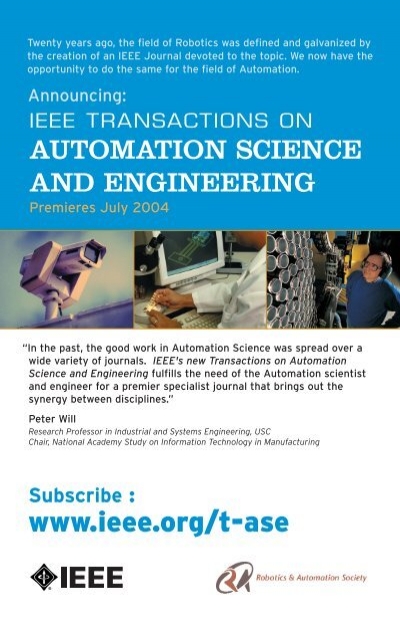Event-Triggered Impulsive Control for Switched Systems Involving Stable and Unstable Modes
IF 6.4
2区 计算机科学
Q1 AUTOMATION & CONTROL SYSTEMS
IEEE Transactions on Automation Science and Engineering
Pub Date : 2025-07-21
DOI:10.1109/TASE.2025.3591021
引用次数: 0
Abstract
This paper investigates the Lyapunov stability problem for switched systems involving stable and unstable modes under event-triggered impulsive control. By constructing multiple Lyapunov functions coupled with average dwell-time methods, some sufficient conditions on Lyapunov stability of switched systems involving stable and unstable modes are provided under event-triggered impulsive control. The designed event-triggered impulsive control strategy is mode-dependent, and Zeno behavior is eliminated. Then, with the construction of a connection between average dwell-time scheme and total dwell time of unstable modes, a relationship between mode-dependent event-triggered mechanism, system dynamics, and switching law is established. It plays a key role in designing event-triggered impulsive control with easy implementation. Moreover, this paper applies the theoretical results to the nonlinear switched system involving dual modes, in which an event-triggered impulsive control strategy is designed for the stability of the switched system. Finally, three numerical examples are given to verify the validity of the proposed results. Note to Practitioners—As a scaled-down version of various industrial plant mechanisms, the industrial plant emulator setup consists of components such as servomechanisms, drives, conveyor belts, and assembly machines. This paper investigates the problem of impulsive control of industrial plant emulator setup. To achieve the Lyapunov stability of switched systems involving stable and unstable modes, the event-triggered impulsive control strategy which integrates the advantages of event-triggered control and impulsive control is proposed. Some sufficient conditions have been constructed in the framework of event-triggered impulsive control. Note that the information of the stable and unstable modes is considered and fully extracted into the design of control strategy. Hence, compared with the general event-triggered impulsive control strategies in which the continuous dynamics of stable modes are ignored, the control burden has been further alleviated. Moreover, the proposed theoretical results can be extended to practical applications, such as single-link robot arm systems, switched multi-agent systems, and automotive engine systems. In future, an interesting topic is to design event-triggered impulsive controller for stability of switched delay systems with dual modes.涉及稳定和不稳定模式的切换系统的事件触发脉冲控制
研究了事件触发脉冲控制下包含稳定模式和不稳定模式的切换系统的Lyapunov稳定性问题。通过构造多个Lyapunov函数,结合平均停留时间方法,给出了事件触发脉冲控制下包含稳定和不稳定模式的切换系统Lyapunov稳定性的一些充分条件。所设计的事件触发脉冲控制策略是模相关的,并且消除了芝诺行为。然后,通过构建不稳定模态平均停留时间方案与总停留时间之间的联系,建立了模态相关的事件触发机制、系统动力学和切换律之间的关系。它在设计易于实现的事件触发脉冲控制中起着关键作用。此外,本文还将理论结果应用于双模非线性切换系统,设计了事件触发脉冲控制策略以保证切换系统的稳定性。最后给出了三个数值算例,验证了所提结果的有效性。从业人员注意:作为各种工业工厂机制的缩小版,工业工厂模拟器设置由伺服机构、驱动器、传送带和装配机等组件组成。研究了工业装置仿真器设置中的脉冲控制问题。为了实现稳定模式和不稳定模式切换系统的Lyapunov稳定性,提出了一种综合了事件触发控制和脉冲控制优点的事件触发脉冲控制策略。在事件触发脉冲控制的框架下,构造了若干充分条件。需要注意的是,在控制策略的设计中充分考虑了稳定和不稳定模式的信息。因此,与忽略稳定模态连续动力学的一般事件触发脉冲控制策略相比,进一步减轻了控制负担。此外,所提出的理论结果可以推广到实际应用中,如单连杆机械臂系统、切换多智能体系统和汽车发动机系统。针对双模切换时滞系统的稳定性问题,设计事件触发脉冲控制器是今后研究的热点。
本文章由计算机程序翻译,如有差异,请以英文原文为准。
求助全文
约1分钟内获得全文
求助全文
来源期刊

IEEE Transactions on Automation Science and Engineering
工程技术-自动化与控制系统
CiteScore
12.50
自引率
14.30%
发文量
404
审稿时长
3.0 months
期刊介绍:
The IEEE Transactions on Automation Science and Engineering (T-ASE) publishes fundamental papers on Automation, emphasizing scientific results that advance efficiency, quality, productivity, and reliability. T-ASE encourages interdisciplinary approaches from computer science, control systems, electrical engineering, mathematics, mechanical engineering, operations research, and other fields. T-ASE welcomes results relevant to industries such as agriculture, biotechnology, healthcare, home automation, maintenance, manufacturing, pharmaceuticals, retail, security, service, supply chains, and transportation. T-ASE addresses a research community willing to integrate knowledge across disciplines and industries. For this purpose, each paper includes a Note to Practitioners that summarizes how its results can be applied or how they might be extended to apply in practice.
 求助内容:
求助内容: 应助结果提醒方式:
应助结果提醒方式:


